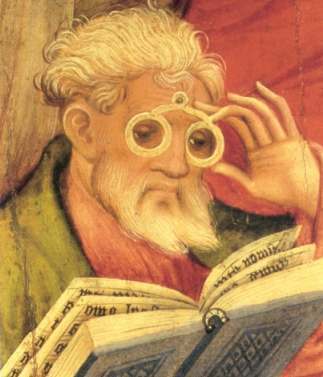
The Glasses Apostle (credit: Conrad von Soest, via Wikimedia Commons)
To flourish, a society must use resources and grow when it has opportunities to do so, or it will lose out later when events in the environment grow harsher or when competition gets fiercer, and it has few or no savings accumulated. How do new, improved ways of doing things become established ways of doing things? One means is by war, as has been mentioned. But the peaceful mechanism can also work, and it is seen in tolerant societies when the people who use new ways are allowed to do so undisturbed, and then they live better. At that point, the majority begins to pay attention and to take up the eccentrics’ ways. ("Wow! These eyeglasses gadgets work.")
This market-driven way is the way of
peaceful cultural evolution, the alternative to the war-driven one. Humans have
taken a long time to reach it, but as a species, we are almost to the point of
being able to evolve culturally without resorting to war.
Now, where are we? We have already shown
that humans must have a general code, usually called their moral code, to live
by just so they can organize their communities and do the activities that they
must do in order to get food, build shelters, care for the sick and injured,
and nurture kids. Furthermore, the code that the West has lived by is due for
some major updating. It has not worked very well over the last century and its
trajectory for the people of the world, if it is not updated/rewritten, ends in
disaster for the whole human race. We have to have a code in place just to
live, but the old one will not do. The problem for this twenty-first century is
to figure out what a new code for society should contain. What moral code would
be rational for us all?
What has been discussed in this chapter is
a quick and simplified summary of what Western civilization has been doing in terms
of writing and re-writing its code for the last few millennia. What has also been
shown along the way is that values endure down generations, if and only if, they
work, i.e. they create nations that function well.
In the nations of the West,
Judeo-Christian tolerance and compassion took a thousand years to synthesize
with Greek abstract thought and Roman practicality, but once the Western
nations learned to see commerce, Science, and exploration as ways of glorifying
God, material progress had to result. ("Do your best to get results in the material
world. God loves you when you do.")
Whether that material progress produced an accompanying moral progress I will deal with later in this book. For now, let’s keep
following what really did happen in the West and save what it meant in moral
terms for just a little longer.
Notes
1. Matthew Allen Fox, The Accessible Hegel (Amherst, NY: Humanity Books, 2005).
2. Edith Hamilton, Mythology: Timeless Tales of Gods and Heroes (New York, NY: Warner
Books, 1999), pp. 16–19.
3. Edward Gibbon, History of the Decline and Fall of the Roman Empire, Vol. 1 (1776;
Project Gutenberg). http://www.gutenberg.org/files/731/731-h/731-h.html.
No comments:
Post a Comment
What are your thoughts now? Comment and I will reply. I promise.